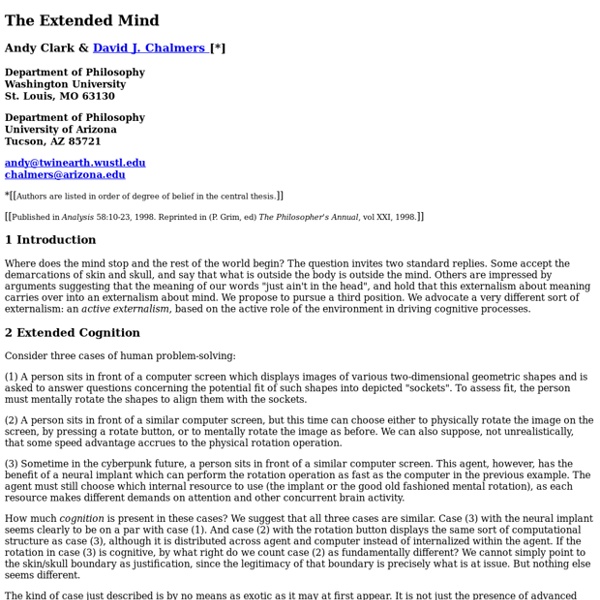Brain Fitness and Cognitive Health Authority: Market Research and Advisory Services
Discover Magazine: The latest in science and technology news, blogs and articles - How Google Is Making Us Smarter
Our minds are under attack. At least that’s what I keep hearing these days. Thumbing away at our text messages, we are becoming illiterate. I have a hard time taking these Cassandras of the Computer Age seriously. More significantly, the ominous warnings feed on a popular misconception of how the mind works. This concept of the extended mind was first raised in 1998, right around the time Google was born, by two philosophers, Andy Clark, now at the University of Edinburgh, and David Chalmers, now at the Australian National University. The mind appears to be adapted for reaching out and making the world, including our machines, an extension of itself. Clark and Chalmers asked their readers to imagine a woman named Inga. In the view of Clark and Chalmers, Inga’s brain-based memory and Otto’s notebook are fundamentally the same. Eleven years later, this argument continues to trigger fierce debate among philosophers, psychologists, and neuroscientists.
10 Websites With Fun Tests To Gauge Your IQ
Intelligence Quotient (IQ) is a term that’s related to the wattage of your brain; in short intelligence and reasoning skills measured across a few standardized tests. Before an inferiority complex starts laying its foundation, remember that I.Q is not a measure of knowledge or its practical application. To rub our egos the right way, you might take a few serious approved tests and arrive at your IQ. FunEducation Try out the array of tests on this site which include a range of serious self discovery tools and fun quizzes. 3SmartCubes If you are looking for a range of tests that measure everything from IQ to your EQ (Emotional Quotient), then this site deserves to be bookmarked. Free IQ Test Just like the name says, this site is a place for a fast, free, and accurate online IQ test. IQ League The 60 Seconds IQ Test on this site is a fun and fast test which pits you against a clock as it countdowns to the minutes on the 10 questions. own system Test Yourself Magic Mnemonic Color IQ Test IQ Test
Is Google Making Us Stupid? - Nicholas Carr
Illustration by Guy Billout "Dave, stop. Stop, will you? Stop, Dave. Will you stop, Dave?” So the supercomputer HAL pleads with the implacable astronaut Dave Bowman in a famous and weirdly poignant scene toward the end of Stanley Kubrick’s 2001: A Space Odyssey. I can feel it, too. I think I know what’s going on. For me, as for others, the Net is becoming a universal medium, the conduit for most of the information that flows through my eyes and ears and into my mind. I’m not the only one. Bruce Friedman, who blogs regularly about the use of computers in medicine, also has described how the Internet has altered his mental habits. Anecdotes alone don’t prove much. It is clear that users are not reading online in the traditional sense; indeed there are signs that new forms of “reading” are emerging as users “power browse” horizontally through titles, contents pages and abstracts going for quick wins. Reading, explains Wolf, is not an instinctive skill for human beings. Also see:
Brain Games & Brain Training
Discover Magazine: The latest in science and technology news, blogs and articles - How Google Is Making Us Smarter
Our minds are under attack. At least that’s what I keep hearing these days. Thumbing away at our text messages, we are becoming illiterate. (Or is that illiter8?) Blogs make us coarse, YouTube makes us shallow. Last summer the cover of The Atlantic posed a question: “Is Google Making Us Stoopid?” I have a hard time taking these Cassandras of the Computer Age seriously. More significantly, the ominous warnings feed on a popular misconception of how the mind works. This concept of the extended mind was first raised in 1998, right around the time Google was born, by two philosophers, Andy Clark, now at the University of Edinburgh, and David Chalmers, now at the Australian National University. The mind appears to be adapted for reaching out and making the world, including our machines, an extension of itself. Clark and Chalmers asked their readers to imagine a woman named Inga. In the view of Clark and Chalmers, Inga’s brain-based memory and Otto’s notebook are fundamentally the same.



